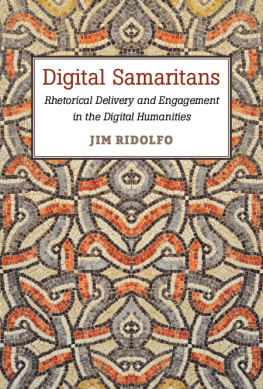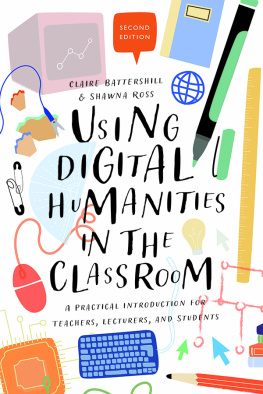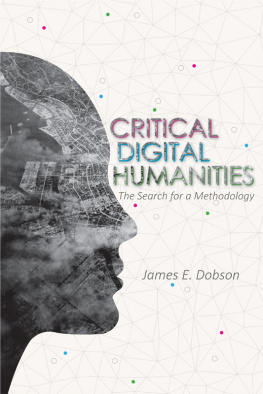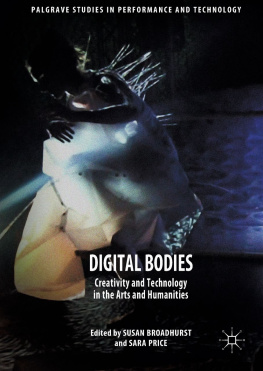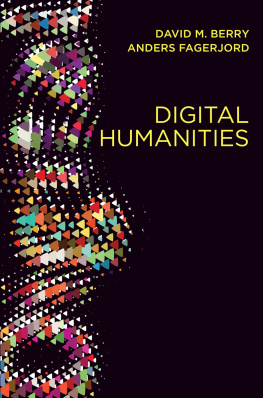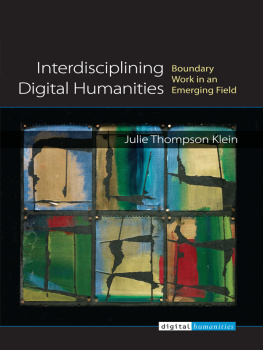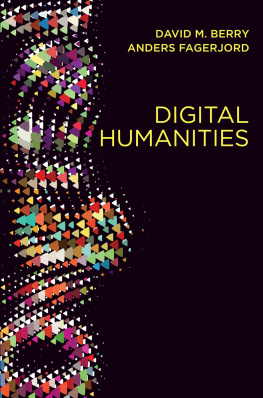Jim Ridolfo - Digital Samaritans: Rhetorical Delivery and Engagement in the Digital Humanities
Here you can read online Jim Ridolfo - Digital Samaritans: Rhetorical Delivery and Engagement in the Digital Humanities full text of the book (entire story) in english for free. Download pdf and epub, get meaning, cover and reviews about this ebook. year: 2018, publisher: The University of Michigan Press, genre: Home and family. Description of the work, (preface) as well as reviews are available. Best literature library LitArk.com created for fans of good reading and offers a wide selection of genres:
Romance novel
Science fiction
Adventure
Detective
Science
History
Home and family
Prose
Art
Politics
Computer
Non-fiction
Religion
Business
Children
Humor
Choose a favorite category and find really read worthwhile books. Enjoy immersion in the world of imagination, feel the emotions of the characters or learn something new for yourself, make an fascinating discovery.
- Book:Digital Samaritans: Rhetorical Delivery and Engagement in the Digital Humanities
- Author:
- Publisher:The University of Michigan Press
- Genre:
- Year:2018
- Rating:5 / 5
- Favourites:Add to favourites
- Your mark:
- 100
- 1
- 2
- 3
- 4
- 5
Digital Samaritans: Rhetorical Delivery and Engagement in the Digital Humanities: summary, description and annotation
We offer to read an annotation, description, summary or preface (depends on what the author of the book "Digital Samaritans: Rhetorical Delivery and Engagement in the Digital Humanities" wrote himself). If you haven't found the necessary information about the book — write in the comments, we will try to find it.
Jim Ridolfo: author's other books
Who wrote Digital Samaritans: Rhetorical Delivery and Engagement in the Digital Humanities? Find out the surname, the name of the author of the book and a list of all author's works by series.
Digital Samaritans: Rhetorical Delivery and Engagement in the Digital Humanities — read online for free the complete book (whole text) full work
Below is the text of the book, divided by pages. System saving the place of the last page read, allows you to conveniently read the book "Digital Samaritans: Rhetorical Delivery and Engagement in the Digital Humanities" online for free, without having to search again every time where you left off. Put a bookmark, and you can go to the page where you finished reading at any time.
Font size:
Interval:
Bookmark:
 Page i
Page i Digital Samaritans
Page iiThe Sweetland Digital Rhetoric Collaborative Book Series publishes texts that investigate the multiliteracies of digitally mediated spaces both within academia as well as other contexts. We encourage submissions that address, among others, topics such as:
New Convergences and Economies;
Shifting Ideologies and Politics;
Global Contexts and Multilingual Discourses;
Reconstructions of Race, Class, Gender, Sexuality, and (Dis)ability;
Emerging Theories and Technologies; and
Reconfigured Divisions and Connections within these Spaces.
We welcome born-digital as well as digitally enhanced submissionsin the form of collections, monographs, or teaching materials of varying lengths and genresthat engage with digital rhetorics histories and futures; its border-fields and transdisciplines; its ethics and aesthetics; its materialities, networks, praxes and pedagogies.
Series Editors:
Anne Ruggles Gere, University of Michigan
Naomi Silver, University of Michigan
Jim Ridolfo
University of Michigan Press
Ann Arbor
Page ivCopyright 2015 by Jim Ridolfo
Some rights reserved

This work is licensed under the Creative Commons Attribution-Noncommercial-No Derivative Works 3.0 United States License. To view a copy of this license, visit http://creativecommons.org/licenses/by-nc-nd/3.0/ or send a letter to Creative Commons, 171 Second Street, Suite 300, San Francisco, California, 94105, USA.
Published in the United States of America by the
University of Michigan Press
Manufactured in the United States of America
2018 2017 2016 2015 4 3 2 1
A CIP catalog record for this book is available from the British Library.
DOI: http://dx.doi.org/10.3998/drc.13406713.0001.001
Ridolfo, Jim, 1979 author.
Digital Samaritans : rhetorical delivery and engagement in the digital humanities / Jim Ridolfo.
pages cm. (Digital rhetoric collaborative)
Includes bibliographical references and index.
ISBN 978-0-472-05280-6 (pbk. : alk. paper) ISBN 978-0-472-07280-4 (hardcover : alk. paper) ISBN 978-0-472-12133-5 (ebook)
1. SamaritansHistoriography. 2. Learning and scholarshipTechnological innovations. 3. Library materialsDigitization. 4. Tsedaka, Benyamim. I. Title.
BM 910. R 53 2015
296.8'17072dc23
2015018378
Page vThis book would not be possible without the support of the National Endowment for the Humanities Office of Digital Humanities, Michigan State University MATRIX, Michigan State University WIDE Research Center, the William T. Taft Foundation at the University of Cincinnati, the Council for International Exchange of Scholars Fulbright Middle East and North Africa Regional Research program, and University of Kentucky. I am grateful for the support of the program officers at the Middle East and North Africa desk in Washington, DC, and Jaclyn Assryian, Aminah Shah, and Gary Garrison. Their guidance and support made my Fulbright experience a truly productive one. The US Consulate in Jerusalem was especially helpful, and I am thankful to Maureen Marroum, Cultural Affairs Specialist for Exchanges in the Public Affairs Office for her support while I was in the West Bank Fulbright program. In the US-Israel Educational Foundation Fulbright program, I would like to thank Deputy Director Judy Stavsky and Executive Director Neal Sherman for their assistance.
To conduct the research for much of this book, I received a 2012 Middle East and North Africa (MENA) Regional Research Fulbright split between the West Bank and Israel. I would especially like to thank Basem Raad, professor emeritus of Al Quds University; Walid Shomaly and the Palestinian Center for Research and Cultural Dialogue; Ruth Stella Amossy and the Analyse du Discours, Argumentation, Rhtorique (ADARR) group at Tel Aviv University; and Benyamim Tsedaka, director of the A.B. Samaritan Institute in Holon.
Projects such as this book do not develop in a vacuum. Im fortunate to have worked with many talented and supportive faculty at Michigan State University. I am especially thankful for the support of rhetoric and writing faculty, especially my doctoral chair Julie Lindquist. From Julie, I gained a greater appreciation for the study of languages and the nuance of language in everyday rhetorical situations. I would also like to thank Malea Powell, Danielle DeVoss, Dean Rehberger, Ellen Cushman, Jeff Grabill, and especially WIDE chief software developer Michael McLeod. At Michigan State University, the confluence of scholar-researchers interested in digital technology and cultural rhetoric are no doubt the reason for this projects existence today, but I am especially thankful to WIDE codirector Bill Hart-Davidson, who has been Page vi my co-PI on the Michigan State University digitization project since its earliest stages.
Bill Hart-Davidson deserves special acknowledgment and thanks for being supportive of the initial Samaritan grant project from the beginning. Many senior faculty would have balked at the idea of a graduate student proposing such a project. He didnt. Bill took a chance working with me, and this book would not be possible without his collaboration and early vote of confidence. Im also grateful for the support of my friends Collin Craig, Donnie Sackey, Kendall Leon, Robyn Tasaka, Angela Haas, Qwo-Li Driskill, and Stacey Pigg. I especially thank Stacey Pigg for reading many drafts of this manuscript. A supportive graduate cohort is a rare gift. Their support and feedback has made my work stronger. I would also like to acknowledge Jessica Enoch and David Gold, who responded to multiple drafts as editors of my 2013 piece in College English. Their insights helped me to shape this book project. Additionally, I also want to thank the editors and staff at University of Michigan Press, especially series editors Anne Ruggles Gere, Naomi Silver, the Digital Rhetoric Collaborative, University of Michigan Press editor Aaron McCullough, and the anonymous manuscript reviewers. Without their critical feedback, vision, support, and editorial expertise, this book would not be possible.
I also want to acknowledge the support of the many language instructors that made this work possible. For Hebrew, I thank Ellen Rothschild, Marc Bernstein, and the Ulpan faculty at Hebrew University and the University of Haifa. For Arabic, I am grateful for Mohamed Elayyadi at the University of Cincinnati, Nada El Majzoub, Maher Alkhateeb, and Ghadeer Shaheen Zannoun at the University of Kentucky, and Wael Kubtan from Jaffa for his tutorship in colloquial Palestinian Arabic. I would also like to thank Shlomi Daskal for his Hebrew and Arabic assistance and expertise.
This project would not be possible without Michigan State University Emeritus Professor Robert Andersons support and translation assistance of Samaritan Hebrew. His work over the last four decades with the MSU Chamberlain Warren Collection and his extensive body of scholarship are important foundations for my work. I would also like to thank Peter Berg, director of special collections at Michigan State University, and David Gilner, director of libraries at Hebrew Union CollegeJewish Institute of Religion, for their collaboration. I am also thankful for the friendship and collaboration of Sharon Sullivan Eretz for her assistance on the National Endowment for the Humanities Office of Digital Humanities Start-Up Grant. In addition, a special thanks to my fall 2013 undergraduate research assistant Charles James Carter for helping me prepare bibliography and spreadsheet data.
Next pageFont size:
Interval:
Bookmark:
Similar books «Digital Samaritans: Rhetorical Delivery and Engagement in the Digital Humanities»
Look at similar books to Digital Samaritans: Rhetorical Delivery and Engagement in the Digital Humanities. We have selected literature similar in name and meaning in the hope of providing readers with more options to find new, interesting, not yet read works.
Discussion, reviews of the book Digital Samaritans: Rhetorical Delivery and Engagement in the Digital Humanities and just readers' own opinions. Leave your comments, write what you think about the work, its meaning or the main characters. Specify what exactly you liked and what you didn't like, and why you think so.

